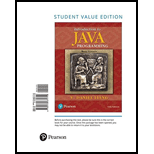
a)
Abstract class:
An abstract class is a class which may or may not include abstract methods and cannot be instantiated but rather can be sub classed.
Legal abstract class:
The conditions for a class to be considered as legal abstract class are mentioned below:
- If a class includes abstract methods, then the class must be declared as abstract.
- The abstract method that is declared within the abstract class must be declared without braces and followed by a semicolon.
Interface:
Interface is a reference type in Java, which contains a collection of abstract methods.
An interface needs to the follow certain conditions such as:
- One cannot instantiate an interface.
- Interfaces do not contain any constructors.
- All methods present in the interface are abstracts.
- An interface does not contain any instance field.
- An interface cannot be extended by a class.
b)
Abstract class:
An abstract class is a class which may or may not include abstract methods and cannot be instantiated but rather can be sub classed.
Legal abstract class:
The conditions for a class to be considered as legal abstract class are mentioned below:
- If a class includes abstract methods, then the class must be declared as abstract.
- The abstract method that is declared within the abstract class must be declared without braces and followed by a semicolon.
Interface:
Interface is a reference type in Java, which contains a collection of abstract methods.
An interface needs to the follow certain conditions such as:
- One cannot instantiate an interface.
- Interfaces do not contain any constructors.
- All methods present in the interface are abstracts.
- An interface does not contain any instance field.
- An interface cannot be extended by a class.
c)
Abstract class:
An abstract class is a class which may or may not include abstract methods and cannot be instantiated but rather can be sub classed.
Legal abstract class:
The conditions for a class to be considered as legal abstract class are mentioned below:
- If a class includes abstract methods, then the class must be declared as abstract.
- The abstract method that is declared within the abstract class must be declared without braces and followed by a semicolon.
Interface:
Interface is a reference type in Java, which contains a collection of abstract methods.
An interface needs to the follow certain conditions such as:
- One cannot instantiate an interface.
- Interfaces do not contain any constructors.
- All methods present in the interface are abstracts.
- An interface does not contain any instance field.
- An interface cannot be extended by a class.
d)
Abstract class:
An abstract class is a class which may or may not include abstract methods and cannot be instantiated but rather can be sub classed.
Legal abstract class:
The conditions for a class to be considered as legal abstract class are mentioned below:
- If a class includes abstract methods, then the class must be declared as abstract.
- The abstract method that is declared within the abstract class must be declared without braces and followed by a semicolon.
Interface:
Interface is a reference type in Java, which contains a collection of abstract methods.
An interface needs to the follow certain conditions such as:
- One cannot instantiate an interface.
- Interfaces do not contain any constructors.
- All methods present in the interface are abstracts.
- An interface does not contain any instance field.
- An interface cannot be extended by a class.
e)
Abstract class:
An abstract class is a class which may or may not include abstract methods and cannot be instantiated but rather can be sub classed.
Legal abstract class:
The conditions for a class to be considered as legal abstract class are mentioned below:
- If a class includes abstract methods, then the class must be declared as abstract.
- The abstract method that is declared within the abstract class must be declared without braces and followed by a semicolon.
Interface:
Interface is a reference type in Java, which contains a collection of abstract methods.
An interface needs to the follow certain conditions such as:
- One cannot instantiate an interface.
- Interfaces do not contain any constructors.
- All methods present in the interface are abstracts.
- An interface does not contain any instance field.
- An interface cannot be extended by a class.
Want to see the full answer?
Check out a sample textbook solution
Chapter 13 Solutions
Introduction to Java Programming and Data Structures: Brief Version (11th Global Edition)
 Microsoft Visual C#Computer ScienceISBN:9781337102100Author:Joyce, Farrell.Publisher:Cengage Learning,
Microsoft Visual C#Computer ScienceISBN:9781337102100Author:Joyce, Farrell.Publisher:Cengage Learning, EBK JAVA PROGRAMMINGComputer ScienceISBN:9781337671385Author:FARRELLPublisher:CENGAGE LEARNING - CONSIGNMENTProgramming Logic & Design ComprehensiveComputer ScienceISBN:9781337669405Author:FARRELLPublisher:Cengage
EBK JAVA PROGRAMMINGComputer ScienceISBN:9781337671385Author:FARRELLPublisher:CENGAGE LEARNING - CONSIGNMENTProgramming Logic & Design ComprehensiveComputer ScienceISBN:9781337669405Author:FARRELLPublisher:Cengage C++ for Engineers and ScientistsComputer ScienceISBN:9781133187844Author:Bronson, Gary J.Publisher:Course Technology Ptr
C++ for Engineers and ScientistsComputer ScienceISBN:9781133187844Author:Bronson, Gary J.Publisher:Course Technology Ptr C++ Programming: From Problem Analysis to Program...Computer ScienceISBN:9781337102087Author:D. S. MalikPublisher:Cengage Learning
C++ Programming: From Problem Analysis to Program...Computer ScienceISBN:9781337102087Author:D. S. MalikPublisher:Cengage Learning EBK JAVA PROGRAMMINGComputer ScienceISBN:9781305480537Author:FARRELLPublisher:CENGAGE LEARNING - CONSIGNMENT
EBK JAVA PROGRAMMINGComputer ScienceISBN:9781305480537Author:FARRELLPublisher:CENGAGE LEARNING - CONSIGNMENT





